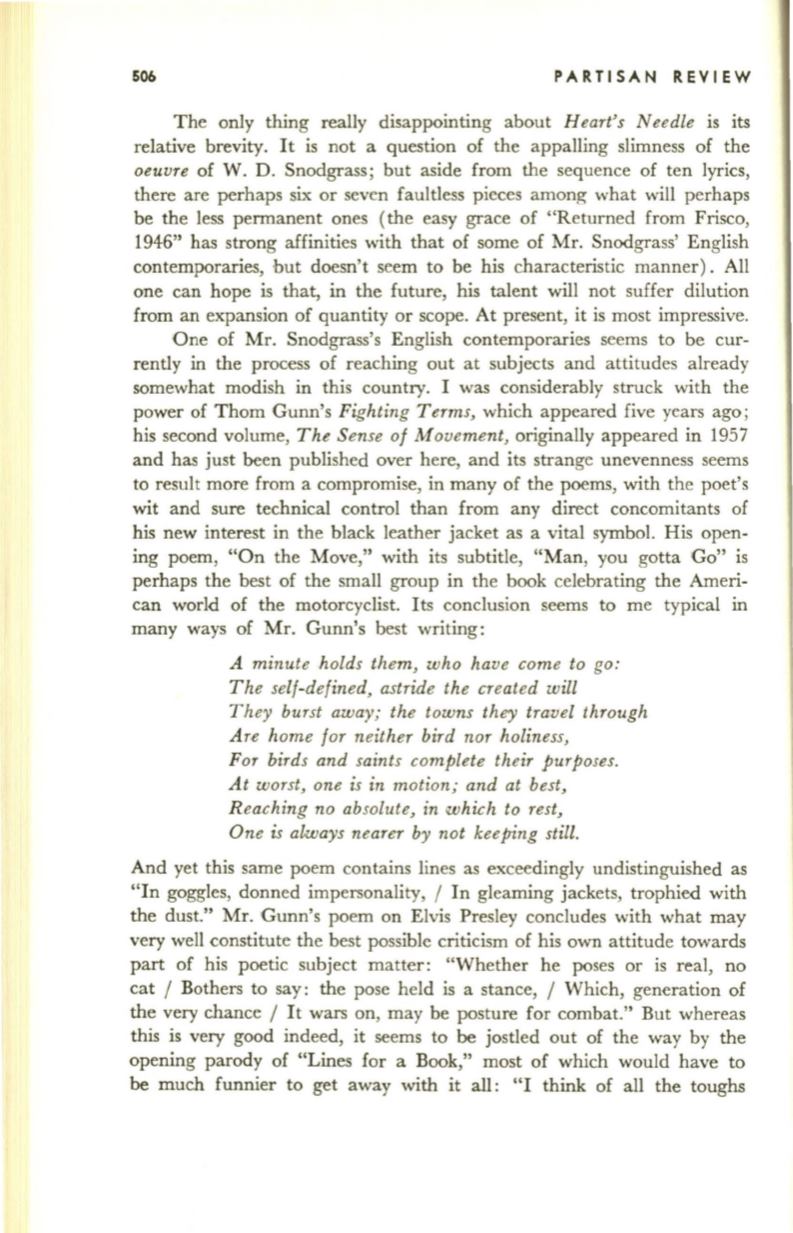
606
PARTISAN REVIEW
The only thing really disappointing about
H eart's N eedle
is its
relative brevity.
It
is not a question of the appalling slimness of the
oeuvre
of W. D . Snodgrass; but aside from the sequence of ten lyrics,
there are perhaps six or seven faultless pieces among what will perhaps
be the less permanent ones (the easy grace of "Returned from Frisco,
1946" has strong affinities with that of some of Mr. Snodgrass' English
contemporaries, but doesn't seem to be his characteristic manner). All
one can hope is that, in the future, his talent will not suffer dilution
from an expansion of quantity or scope. At present, it is most impressive.
One of Mr. Snodgrass's English contemporaries seems to be cur–
rently in the process of r eaching out at subjects and attitudes already
somewhat modish in this country. I was considerably struck with the
power of Thorn Gunn's
Fighting Terms,
which appeared five years ago;
his second volume,
The Sense of Mo vement,
originally appeared in 1957
and has just been published over here, and its strange unevenness seems
to result more from a compromise, in many of the poems, with the poet's
wit and sure technical control than from any direct concomitants of
his new interest in the black leather jacket as a vital symbol. His open–
ing poem, "On the Move," with its subtitle, "Man, you gotta Go" is
perhaps the best of the small group in the book celebrating the Ameri–
can world of the motorcyclist. Its conclusion seems to me typical in
many ways of Mr. Gunn's best writing:
A minute .holds th em, who have come to go:
The self-defined, astride the created will
They burst away; the towns th ey travel through
Ar.e home for neither bird nor holiness,
For birds and saints complete their purposes.
At worst, one is in motion,' and at best,
R eaching no absolute, in which to rest,
One is always nearer by not keeping still.
And yet this same poem contains lines as exceedingly undistinguished as
"In goggles, donned impersonality,
I
In
gleaming jackets, trophied with
the dust." Mr. Gunn's poem on Elvis Presley concludes with what may
very well constitute the best possible criticism of his own attitude towards
part of his poetic subject matter: "Whether he poses or is real, no
cat
I
Bothers to say: the pose held is a stance,
I
Which, generation of
the very chance
I
It
wars on, may be posture for combat." But whereas
this is very good indeed, it seems to be jostled out of the way by the
opening parody of "Lines for a Book," most of which would have to
be much funnier to get away with it all : "I think of all the toughs


